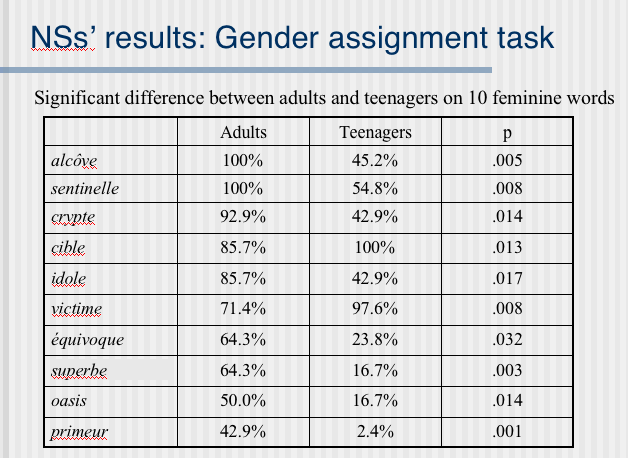February 25, 2008
You say feminine, I say masculine, let's call the whole thing off
Last week, Dalila Ayoun, of the Department of French and Italian here at the University of Arizona, gave a talk in our linguistics colloquium series in which she dropped a bombshell: native French speakers don't know the genders of French nouns!
OK, that's not quite right: it would be more appropriate to say that native French speakers don't agree on the genders of French nouns. They really don't agree. Fifty-six native French speakers, asked to assign the gender of 93 masculine words, uniformly agreed on only 17 of them. Asked to assign the gender of 50 feminine words, they uniformly agreed only 1 of them. Some of the words had been anecdotally identified as tricky cases, but others were plain old common nouns.
Ayoun didn't set out to test whether native French speakers can accurately identify French nominal gender. Her primary research interest is in second-language learning of French. Like nearly everyone in the field, and with good reason, she had assumed that native speakers behave fairly uniformly with respect to the grammar of their native language.
Second language acquisition studies often have a common structure. The experimenter tests people learning the language on a particular linguistic task. Usually there are different groups of second language learners -- advanced vs. beginning, etc. They all do the task, and the experimenter looks at how many mistakes they make, how long they take to do the task, etc., and draws conclusions about the course of language learning, the efficacy of the teaching technique, or whatever.
The experimenter always also gives the task to native speakers, as a kind of control group, to show that when the language has been fully, correctly acquired, speakers perform at or near ceiling -- close to 100% right.
Just to give a typical example, I have student who is looking at second-language acquisition of Chinese. She is having her subject perform a task in which they form a sentence containing a relative clause from two independent sentences. (Input: John saw a man. The man was tall. Correct response: John saw the man who was tall.) In my student's pilot study, she discovered that she might have to reduce the number of sentences in her study, since even fairly advanced second language learners were taking up to an hour and a half to complete the test. In contrast, her native speaker subjects were taking ten minutes to do the same test, with of course 100 per cent accuracy. This kind of disparity between native speakers and second-language speakers is the norm, rather than the exception.
Ayoun was investigating second-language learning of grammatical gender in French -- a major difficulty for learners from non-gender languages like English. She had constructed a couple of tasks: grammaticality judgments of sentences where there was a gender agreement mismatch, and a gender-assignment task, where subjects were given a noun and had to choose among "masculine", "feminine", "both", or "I don't know".
In both tasks, to her great surprise, she found a great deal of disagreement among her native-speaker controls! In these tasks, there is always a normatively 'correct' answer -- French dictionaries and textbooks all agree on what the genders of nouns are, and how gender agreement in sentences should turn out -- in the same way they agree on how to form relative clauses, and how to form passives, and where to put clitic pronouns, and so on. Native speakers would be expected to perform close to ceiling on this grammatical task, as on others. But, surprisingly, they don't.
There's an even more interesting twist in Ayoun's native-speaker results. Her native speakers fell into two groups: 14 adult speakers and 42 teenage speakers. On most grammatical tasks, for all intents and purposes, teenagers' native-language abilities are identical to adults' abilities. But when she broke down the gender-assignment task results by age, she found that teenagers showed considerably more variation than the adults. On the 50 feminine nouns, for example, the 14 adults all agreed on 21 of them, while the 42 teenagers agreed on only one: cible, 'target'. Of the 93 masculine nouns, the adults agreed on 51 of them, while all adults and teenagers agreed on only 17 (of 93!!)
Below I reproduce one of Ayoun's tables illustrating significant differences in the rates at which adults and teenagers agreed on the gender of 10 feminine nouns.

There are many questions one would like to ask about this, of course, and since Ayoun's study was not designed to answer questions about native-speaker variation in gender assignment, answers to most of them will have to await further experimentation. But the result itself seems really remarkable to me. According to Ayoun, the last study in which anyone systematically tested native speakers' deployment of grammatical gender in French was Tucker et al. (1977) -- more than thirty years ago! Work to be done.
For the interested, some of the second-language speakers' results from the study have already appeared in Ayoun (2007). And second language speakers of French, take heart! Make your grammatical gender agreement mistakes with confidence. There's a chance that your native-speaker interlocutor will agree with your version!
Ayoun, D. (2007). The acquisition of grammatical gender in L2 French. In D. Ayoun (ed.), French Applied Linguistics, pp. 130-170. Amsterdam and Philadelphia: John Benjamins.
Tucker, G. R., W.E. Lambert, and A. Rigault. 1977. The French speaker's skill with grammatical gender: An example of rule-governed behavior. The Hague: Mouton
Posted by Heidi Harley at February 25, 2008 02:42 AM